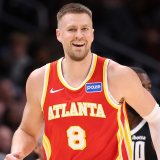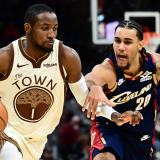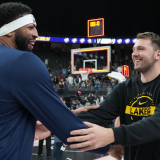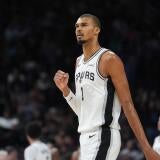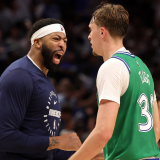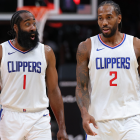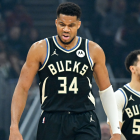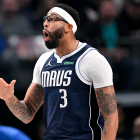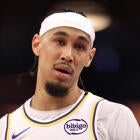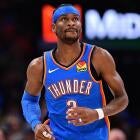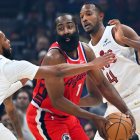NBA offseason grades for every Western Conference team: Lakers, Clippers go wrong way, only two teams earn 'A'
We're grading every Western Conference team with most offseason business in the books

Grading the Eastern Conference on just about anything is a relatively simple matter. The Boston Celtics are on top. Everyone else is chasing them. They might be doing so here and now. They might be preparing to challenge Boston a few years down the line. But the Celtics are the conference's best team, they are a reasonably young team, and they are an extraordinarily well-run team. They are the standard. Anything a team does can be viewed through the prism of what it means in an eventual matchup with Boston.
But the West? Yeah, good luck figuring it out. Of the 15 teams in the conference, pretty much everyone except Portland figures to be reasonably competitive (at least for now). There is no obvious favorite, and even if there were, last postseason's game of rock-paper-scissors between the Nuggets, Timberwolves, Thunder and Mavericks proved that it hardly matters which team was the best all year if the bracket breaks in the right way.
Eastern Conference teams are building to challenge the Celtics. Western Conference teams have to be prepared to beat anybody, and then when they've emerged from the Thunderdome triumphant, the Celtics will probably be waiting for them afterward. Therefore grading the West's offseasons will be a much more holistic exercise. Moves don't need to be as matchup-focused. What matters most here, aside from the obvious things like talent and asset-valuation, will be adaptability. Are you prepared to play several kinds of teams? Are you equipped to pivot if need be? We'll start at the top and then work our way down.
Oklahoma City Thunder: A
The Thunder had a flawless offseason. They turned a player that was frankly a negative for them in terms of postseason fit in Josh Giddey for perhaps the most desirable role player that was available this offseason in Alex Caruso. Oklahoma City now has two of the five best perimeter defenders in the NBA, and it can weaponize the Caruso-Lu Dort pairing in a multitude of ways. Caruso was so good on the ball in Chicago that the Bulls never really had a reason to let him play off of it. If Dort is defending the best opposing scorer on most nights, Caruso could pretty easily lead the NBA in steals. The two of them could share duties against top scorers to preserve energy. If the Thunder do decide they have a need that they must address through a significant trade, Dort is now just redundant enough to justify moving, especially with Cason Wallace in the pipeline as well.
Isaiah Hartenstein fills an enormous hole as a more traditional center. He likely won't start, but he can play just as easily alongside Chet Holmgren as he can without him. The cap figure is gaudy, but the contract itself is actually very team-friendly. The Thunder have a team option on the final year, which conveniently comes right as rookie extensions for Holmgren and Jalen Williams kick in. The Thunder can let him go before his salary becomes burdensome. They can use that team option as leverage to negotiate a more favorable long-term deal down the line. That's largely what they just did with Isaiah Joe and Aaron Wiggins. The Thunder could have declined cheap team options on both of them, allowing the pair to reach restricted free agency and get paid a year early, but at rates the Thunder can stomach. Every move the Thunder made fits neatly onto their balance sheet.
The cherry on top? Nikola Topic was a worthwhile swing at a long-term shot-creator at No. 12 in the NBA Draft. Other teams were scared off by his torn ACL and shooting concerns. The Thunder weren't going to have minutes available this year anyway, and they have one of the NBA's best shooting coaches in Chip Engelland to work on his jumper.
Is there a weakness here? Maybe a two-way power forward to add a bit of rebounding and shooting. Maybe another shot-creator. But the Thunder have the matching salary and picks to go and get pretty much anyone they want. They have the Western Conference's best roster and the chips to improve it in whatever manner they see fit. This was a home run offseason.
San Antonio Spurs: A
In 2031, Victor Wembanyama will be an eight-year veteran presumably at the peak of his powers. We don't know where the Sacramento Kings will be, but they've missed the playoffs in 17 of the past 18 years, so it feels reasonable to assume they'll be worse than Wembanyama's team. The Spurs gained the right to swap first-round picks with the Kings in 2031 for ... taking on Harrison Barnes, a good player who makes them better this season.
It's been that sort of offseason for the Spurs. They have taken on basically no long-term risk and yet they've managed to substantially improve both their short- and long-term prospects. The Rob Dillingham trade is another example of this approach. Could San Antonio have used him? Sure. But with Stephon Castle incoming, it was reasonable of the Spurs to decide that they didn't want to give major developmental minutes to two rookie ball-handlers at the same time, especially given the possible developmental that could have on their bigger young players. So instead, they turned Dillingham into two more home-run swings on Timberwolves picks in the 2030s.
Instead of two rookies handling the ball for the Spurs next season, Castle will spend his rookie season getting his bachelor's degree in point guarding from Chris Paul University. Just ask Shai Gilgeous-Alexander how valuable such an education can be. The Spurs outscored opponents by over five points per 100 possessions when Wembanyama played with Tre Jones last season, but without Jones, Wembanyama lineups were blasted by nearly 17 points per 100. This team was desperate for a point guard and it wound up with a point god. That says everything you need to know about this offseason.
Dallas Mavericks: B
The Mavericks made three fundamental transactions this offseasons, with a handful of second-round picks moving in the background:
- Klay Thompson replaces Tim Hardaway Jr. as the expensive third scorer.
- Quentin Grimes replaces Josh Green as the developmental 3-and-D guard.
- Naji Marshall replaces Derrick Jones Jr. as the wing stopper.
Thompson is an enormous upgrade over the version of Hardaway that barely played down the stretch last season. He's still a reasonable upgrade on the better version of Hardaway, who competed for Sixth Man of the Year early in the season. Dallas didn't need a heat check scorer. They needed a reliable spacer. They don't come more reliable than Thompson. Hardaway's ball-handling won't be missed. Jaden Hardy is ready to take on a more consistent role if needed.
Grimes-for-Green could go either way. If Dallas is getting 2023 Grimes, this is an upgrade. He was a far more comfortable shooter even in New York. The shot-creation in Dallas is going to do wonders for him. The more tentative 2024 version that clearly struggled with Donte DiVincenzo breathing down his neck? That player isn't doing Dallas much good, but this isn't an essential slot anyway. If the Mavericks have their druthers, Olivier Maxence-Prosper will be ready for bench 3-and-D minutes anyway. So this is a nice upside swing on a player who theoretically fits in.
Jones vs. Marshall is where this gets interesting. Marshall is a better shooter. He's not nearly as bouncy, and Luka Doncic likes having as many lob threats as possible on the floor. This is a net loss athletically. It's a net loss defensively as well, though Marshall is quite good on that end of the floor. He just isn't as suited to locking up opposing guards as Jones is. His bulk will serve Dallas well against bigger forwards, but that was less of a concern with P.J. Washington in place.
The Mavericks got better overall this offseason, but they're also going to have to win slightly differently. The formula last year, at least after the deadline, was suffocating defense and good offense that rose to great late in games. This year's team has to win with offense because it won't be quite as fearsome on defense, especially if Thompson, just by virtue of his stature, needs to start with Doncic and Kyrie Irving. This concept isn't better or worse. It's just different, and the Finals against Boston showed why "different" might have been the goal here. Dallas didn't have nearly enough offensive versatility or space to score with the Celtics. Now the Mavs do. It came at a price, but it was a fair one.
Phoenix Suns: B
The Suns didn't dramatically alter their fortunes. All of their previous concerns remain. But given the very limited resources at their disposal, they did quite well. Tyus Jones and Monte Morris are real NBA point guards, something they didn't have last year. Mason Plumlee is a suitable backup center. Ryan Dunn may never be a professional-caliber offensive player, but his defense will be welcome on a team with this much scoring. They kept Royce O'Neale at a reasonable rate. They even stomached a small fortune in extra tax payments to keep Josh Okogie as tradable deadline salary. None of this is especially exciting, but it's pretty good given the circumstances. If there's a drastic move to be made here, it will come during the season and involve their 2031 first-round pick.
The possible difference-maker here, if significant improvement is even possible, is in the hire of Mike Budenholzer. For all of his questionable playoff tactics, no coach in basketball is better at raising his team's floor than Budenholzer. His teams take the right shots. They protect the basket. They tend to stay healthy. He alone doesn't fix what's wrong with the Suns, but he's going to make them a better, more consistent regular-season team. Considering how scary this conference's depth is, that's going to matter. The Suns don't have a championship-caliber roster right now, but Budenholzer is at least going to find whatever the best version of this team is.
Golden State Warriors: B
It might be sacrilegious to say it, but the gap between Klay Thompson and Buddy Hield, at least in the regular season, has been pretty small over the last two years. Their 3-point shooting percentages are nearly identical, and Thompson got there with better shot-creation from teammates. Thompson's volume was a bit higher, but not markedly so. Both are poor defenders at this point, though Thompson does still have utility against bigger players. Functionally, the Warriors are getting similar things from Hield that they would have gotten from Thompson. They're just getting them at a far lower price.
Kyle Anderson was put on this Earth to play for Steve Kerr. A high-IQ passer that defends multiple positions and has weird stylistic tics? It's like Shaun Livingston all over again. De'Anthony Melton is the sort of high-end 3-and-D guard that just usually isn't available for mid-level money. The Warriors are still a tax team, but they've ducked both aprons and have the flexibility to improve elsewhere if they want (by, say, trading for Lauri Markkanen).
This isn't a championship-caliber roster yet, but it's gotten much younger, much cheaper and much more flexible. We still have to see what the long-term plan is and how committed they are to winning while Stephen Curry still can, but as a bridge offseason while they sort that out, this was pretty good business.
Minnesota Timberwolves: B
The Karl-Anthony Towns trade was a necessary evil. This team was not financially sustainable long-term. Every other core piece was indispensable. Both Naz Reid and Julius Randle are swings at replacing most of what Towns brought to the table. The 2025 team is a shade worse, though if Randle's jumpers go in and he buys in on defense, his creation will be welcome. They're still more or less where they were in May: somewhere between the center of the championship picture and the periphery. But they've extended their window significantly by solving their money problems.
Rob Dillingham helps on that front, and given those money woes, the Timberwolves lacked an obvious alternative when it came to landing a Mike Conley successor. Dillingham can develop slowly now, especially with Donte DiVincenzo in place as a high-end bench scorer. Minnesota gave up no present-day value to get him. It's a high-risk maneuver, but a worthwhile one in their context. In Dillingham, Reid, Jaden McDaniels and of course Anthony Edwards, Minnesota has the core of a team that can win no matter what happens with Randle and eventually Rudy Gobert.
Minnesota has to get dinged a bit for the uncertainty atop the organization. We still don't know who's going to own the team when the dust settles, and general manager Tim Connelly can reportedly opt out of his contract after the season. We can't reasonably predict what Minnesota's future looks like until we have clarity on those fronts. But had they failed to move Towns now, they might have been stuck with him for the rest of his contract. They're maneuverable now, and with Edwards, they'll almost always be in the title picture moving forward. Even if they got slightly worse, that flexibility means more in the long run.
Utah Jazz: B-
Kyle Filipowski was the No. 4 recruit in the 2022 high school class, according to 247Sports. Isaiah Collier was No. 1 in 2023. Cody Williams was No. 7. Utah landed all three in the 2024 NBA Draft, and while high school rankings are far from a safe measure of pro prospects, it's worth pointing out just how much raw talent the Jazz secured in an otherwise relatively weak class. For a team that is very much still rebuilding, that matters a great deal. These rookies are joining an excellent coaching staff and playing for a roster with minutes and shots available. That talent will be put in position to succeed.
In a vacuum, renegotiating and extending Lauri Markkanen was the right call. It's hard to get players of his caliber to Utah. He wants to be there. His trade value remains significant. But without knowing what the long-term plan here is, it's hard to give Utah too good a grade for keeping him. He can't legally be traded for another year. Does that mean the Jazz are in for another year of their whole "decent for 50 games and tanking for the last 32" shtick? Utah has sniffed around bigger acquisitions like Mikal Bridges and Jrue Holiday. Will they take another swing during the season? Without knowing what exactly Golden State or anyone else offered for Markkanen, we cannot categorically say that the Jazz should or should not have traded him. But trading him represented a direction. Utah doesn't have one at the moment. The individual moves made sense, but the overall picture is still murky.
Memphis Grizzlies: C+
The Grizzlies did most of their work last offseason and during the season, but we're not giving grades for the discovery of Vince Williams or GG Jackson here. The Grizzlies have made only one move of significance this summer, and it was the unexpected decision to draft Zach Edey at No. 9 overall.
The fit makes plenty of sense. The Grizzlies have thrived in the past with Jaren Jackson Jr. playing power forward next to a bigger center. Edey brings many of the same traits to the table that made Jonas Valanciunas so valuable in Memphis. He's going to generate easy points near the rim and serve as a safety valve late in the shot clock. He's going to pull in offensive rebounds and set hard screens. His mobility is a question on defense. At a certain point it's just helpful to have a bulky 7-foot-4 guy hanging out near the basket. In a normal class, his limited upside would have made it a questionable pick. In this one? Fine work by the Grizzlies to take a swing on an archetype they've succeeded with in the past. Now just get Luke Kennard signed and you'll be all set.
Houston Rockets: C+
Let's start with the big win: Reed Sheppard at No. 3 looks like a great pick. Even if you put aside his stellar summer league, the Rockets already had two high-end young guards in Amen Thompson and Jalen Green. Both are elite athletes. You maximize athleticism by surrounding it with shooting. It's too early to say which of Houston's youngsters last through this rebuild, but whoever does will benefit from Sheppard's presence.
Where you fall on Houston's offseason is going to depend on what you think of their blockbuster, player-less trade with the Nets. It's reasonable to like that deal. They gave up two draft assets (Brooklyn's unprotected pick in 2025 and an unprotected swap in 2026) to get four (swap rights with Phoenix in 2025, Phoenix's pick outright in 2027, and the two best picks in 2029 from the Suns, Mavericks and themselves, with the worst of the three going to Brooklyn). You could also point out that there has been substantial reporting behind the notion that the Nets would not have made the Mikal Bridges trade, and therefore increased the value of their own picks, without knowing that they could also make this one.
I am not questioning the reporting here. I think the Nets told the world that they weren't trading Bridges without getting their own picks back. What I question is their resolve. Just because they were saying it in May and June doesn't mean they were going to hold to it forever, especially if you believe Ian Begley's reporting that Bridges both asked for a trade to the Knicks and was prepared to force his way there as a 2026 free agent if the Nets hadn't cooperated. They frankly had little to gain by keeping a player who didn't want to be there. They had no obvious path to the sort of prime superstar that would have made keeping Bridges worthwhile. And New York's offer was so enormous that taking it would have been the right move whether they could properly tank afterward or not. Sure, it would have meant sending the Rockets great picks, but with control of New York's and Phoenix's drafts in place, the Nets still could have comfortably rebuilt. This is a team, after all, that just rebuilt without its own picks less than a decade ago. It's possible even if it isn't preferable.
So I, personally, ding the Rockets for sending Brooklyn its picks in 2025 and 2026 back. I think the Nets would have folded and traded Bridges anyway, and those Nets picks would've become among the most valuable chips in the league. There's quite a bit of upside to be found in the picks Houston got back, but there's an increased layer of certainty that comes with picks from a team that is bad right now. Remember, even with Bridges, the Nets just sent the Rockets the No. 3 pick that became Reed Sheppard. So Houston's offseason gets a decent grade. If you like the Nets trade, it might even deserve a great one. Houston's future is relatively bright either way. I think it would've just been a bit brighter if they'd held the Nets picks hostage.
Portland Trail Blazers: C
The Deni Avdija trade was deceptively valuable. Portland badly needed perimeter defense, and having a bit of spare playmaking lying around rarely hurts. Avdija just had a breakout season for the Wizards and is just starting an ultra-valuable four-year, $55 million rookie extension. He's still young enough to be a core piece here. This is the sort of veteran the Blazers should be targeting: relatively young ones on cheap contracts.
The trouble here is that they have too many veterans who miss one or both of those boxes. Why is Jerami Grant still on this team? He's 30, has four very expensive years left on his contract and is going to contribute a few extra wins that will only hurt the Blazers on lottery night. Donovan Clingan was the right pick at No. 7, but he's now in a center rotation with Deandre Ayton and Robert Williams III both making big money. Even Anfernee Simons is redundant long-term if you assume that Scoot Henderson and Shaedon Sharpe are the backcourt of the future.
The Blazers are rebuilding. It's just time they committed a bit more firmly to that. Players like Grant and Williams, at the very least, will not be part of the next great Blazers team. Pretending otherwise is a waste of everyone's time.
New Orleans Pelicans: C
The Dejounte Murray trade was fine in a vacuum, though perhaps a slight overpay. Two first-round picks, a good veteran and a promising recent lottery pick is a pretty substantial price for a one-time All-Star, but that's a reasonable premium when you factor in his relatively cheap four-year contract. The Pelicans paid for cost certainty in the face of quite a bit of cost uncertainty elsewhere on the roster, and Murray is a nice fit. The Pelicans needed a point guard. They also probably thought they needed more mid-range shot-making.
Therein lies the issue with this Pelicans offseason. Murray made perfect sense as a Brandon Ingram replacement. He could give them Ingram's tough shotmaking at a position of greater need, thus freeing them up to start Trey Murphy and his more valuable and versatile skill set in Ingram's slot. They could then trade Ingram for the center they need. Well, at least that's what we (and probably they) thought would happen. Now, well, it doesn't seem like anyone wants Ingram.
In the short-term, this creates a serious roster imbalance. The Pelicans have two centers right now: incoming rookie Yves Missi and minimum-salary signing Daniel Theis. Meanwhile, they have six non-centers that likely consider themselves starting-caliber players: Ingram, Murray, Murphy, Zion Williamson, Herb Jones and C.J. McCollum. If there's a solution here, it's not immediately evident. I suppose Jones could defend most centers and the Pelicans could just start five of their non-centers? That team would struggle on defense and never get any rebounds, but it also probably wouldn't even generate the typical benefits of playing small because the 3-point shooting still wouldn't be great.
The long-term issue is financial. The Pelicans can't extend Ingram, even at a sub-max number, if they also expect to pay everyone else. Even if ownership was willing to pay the tax consistently (and history says it isn't), you'd start running into apron issues immediately. That's a non-starter for where the Pelicans are. But the alternative if no trade presents itself is losing Ingram for nothing. That's just as perilous. The Pelicans are a very talented team, but they aren't so good they can afford to just let former All-Stars walk. It's not as though they could replace his talent even if his production could be recreated in the aggregate. The Pelicans have to find an Ingram trade at some point. Even if it's at the deadline. Everything else is in place for a real window to contend. If they can't turn him into a center, that window is jeopardized.
Sacramento Kings: D+
The DeMar DeRozan fit, in itself, is bad but justifiable. The Kings fell from "most efficient offense in NBA history" in 2023 to "barely above average" in 2024. They want to win with offense so they found another scorer. Should that scorer be 35 years old on a roster that is still relatively young? Should he be a non-defender? Should he be someone that barely attempts 3s on a roster that already has two high-usage creators in the starting lineup and one of the NBA's best bench gunners returning on a four-year, $78 million deal? The answer to all of these questions is "no," but it's a no that doesn't have to torpedo their season. If nothing else, he's a floor-raiser. DeRozan is always healthy, he gets to the line a ton and he's great at the end of games. He's valuable even if he isn't exactly what this team needs. Fine. They'll hover in the mid-40s in terms of wins again this season. That's a fine barometer for the Kings. It just doesn't seem like one they're at peace with.
Taken in totality, this Kings offseason raises a lot of red flags. Sacramento missed the playoffs 16 years in a row. They made it in the 17th year. In Year 18, their record dipped by two wins, but because of injuries and a tougher conference, they fell from the No. 3 seed to No. 9. In the immediate aftermath of their two-win decline, they played hardball in contract negotiations with 2023 Coach of the Year Mike Brown, who is, again, the only coach to lead them to the playoffs since 2006. They did get him signed eventually, and there was no reporting suggesting that his job was in immediate risk, but remember, this is the team that fired Michael Malone because of a losing streak that came as DeMarcus Cousins dealt with a case of viral meningitis, so there's a history of irrationality here. They immediately followed that up by trading away a potentially very valuable pick-swap for an aging, big-name player with a redundant skill set. To be frank, these are the actions of the "Kangz" of old rather than the more normal, pragmatic franchise they were becoming during Monte McNair's early tenure. It screams immense and unwarranted ownership pressure, and there's at least some reporting supporting that idea.
There just wasn't a reason to force a big move this offseason. There's potential harm to doing so. It's going to be a lot harder for Keegan Murray to develop as an on-ball scorer if he's spending next season watching DeRozan dribble. Sacramento's top-four scorers last season were 27 or younger, and 10 of their top 11 were in their 20s. They can and should be slow-playing this thing. If there's a big trade to be made here, it should be a for defensive-minded forward. That player isn't available right now. That's fine. Give it six months to a year. That player will find his way onto the market. The Kings can still get him. They still control most of their own picks, though the salary side of the equation is more complicated with a DeRozan overpay on the books (and yes, it was an overpay simply because nobody else wanted to pay him that much). But there's just an overriding sense here that the Kings are more concerned with immediate splashes than managing this promising build properly and patiently. If getting DeRozan had made them a genuine title contender, that might have been justifiable. It didn't. It made them slightly more difficult cannon fodder for the real juggernauts of the West. The difference between 46 and 48 wins is pretty minimal. The Kings should've realized that. Maybe another year in that ballpark sends that message.
Denver Nuggets: D
The best five-man lineup in the NBA by total plus-minus in each of the past two seasons has been Denver's starting five. The Nuggets broke it up willingly and without compensation by allowing Kentavious Caldwell-Pope to walk in free agency. To a lot of teams, the second apron is a reasonable fear. Making the jump up to championship-quality is hard under normal circumstances. It's nearly impossible when you're restricted by the aprons. But the Nuggets were already a championship-caliber team. If anyone was suited to weather that storm, wouldn't it have been Denver? Sure, frozen draft picks are scary. Nobody wants to risk having future draft picks dropped to the end of the first round. But Denver has reached the Finals once in its history and has a three-time MVP at the peak of his powers right now. Who cares if you sacrifice future flexibility? This is literally the single widest championship window this franchise has ever had. It might take them 50 years to find another Nikola Jokic. That's how long the Bucks waited between Kareem Abdul-Jabbar and Giannis Antetokounmpo, after all. If there is any team that should be throwing caution to the wind right now, it's Denver.
It would be one thing if the Nuggets were breaking it up with a clear plan to utilizing their newfound financial flexibility. Heck, they could've found creative ways of replacing Caldwell-Pope in the moment. There were paths to structuring his exit as a sign-and-trade and then combining that outgoing salary with Zeke Nnaji and their 2031 first-round pick to get a real replacement, one that even could have kept them below the second apron. Instead, they're ... starting Christian Braun? He's a starting-caliber player, sure. But his absence weakens the bench, and it's worth pointing out that a Nuggets team that already took the fewest 3s in the NBA just lost the players who attempted the third-, fourth- and seventh-most 3s on their roster from last season. Shooting is going to be even harder to come by for them now. Russell Westbrook doesn't help in this regard. Braun is a steep downgrade from Caldwell-Pope as a shooter.
Calvin Booth appears committed to reloading this team with the young players he's recently drafted. It might work. Braun is a good player. Julian Strawther -- Denver's best hope at another high-end shooter -- scorched summer league. Peyton Watson will make an All-Defense team if he ever gets the minutes. And the bar frankly isn't that high here simply because of how good Jokic, Jamal Murray and Aaron Gordon already are. But this offseason looks so much better with just one more semi-reliable veteran guard on the roster. If Denver had been the team to sign Gary Trent Jr. for cheap instead of Milwaukee, the conversation is different. There's just not much certainty here. The Nuggets can still win the title because those young players might pop and having the league's undisputed alpha obviously means quite a bit, but they've made their lives harder this summer.
Los Angeles Lakers: D
The Lakers have thus far changed two roster spots this offseason. Spencer Dinwiddie and Taurean Prince are out. Dalton Knecht and Bronny James are in. The Lakers have not added a single veteran on a full-time NBA contract. The only things keeping them from an outright "F" are the good luck they got in Knecht falling to No. 17 and the fact that they haven't actively made things worse through a bad trade (and considering this front office's history, that was certainly on the table).
It just isn't clear what exactly this team's plan is. If the Lakers believe that LeBron James and Anthony Davis are still a championship-caliber duo, they should be pouring every available resource into supporting them. That obviously means those two valuable future first-round picks they can trade in 2029 and 2031, but it's also smaller things. The Lakers haven't even been able to use second-round picks to clear players like Christian Wood or Cam Reddish just to create a roster spot to sign someone new. At the moment, they literally can't even add a vet. They're doing nothing to improve a Play-In team that's only getting older and more injury-prone with each passing year.
Maybe they don't believe James and Davis are still a championship-caliber duo. That's a reasonable conclusion given their age and injuries as well. But if that's the case ... why are they still on the team? Why not move them for assets that could help build the next truly great Lakers team? Sure, there's little to be gained by tanking this year. The Hawks own their first-round pick. But the longer you hold James and Davis, the more value they are likely to lose. If the right move is to blow it up and swallow a few embarrassing years, so be it. Whatever decisions the Lakers make should be driven by the team's pursuit of championship No. 18.
It doesn't feel like they are. It seems as though the Lakers have no real plan to build a champion in the present or future, so instead they're clinging to whatever shred of relevance that's still available to them. The eternal YouTube clip of LeBron and Bronny playing together for the first time will happen in a Laker uniform. That's a cool bit of history. It has no tangible value on the court. Neither does the idea of James retiring as a Laker. It's vague prestige for a franchise that has more than enough of it. The Lakers don't need star power for its own sake anymore. They need someone, anyone, to actually offer up a real plan to compete for titles again.
If someone has one, it isn't apparent. So the Lakers will probably just end up as this season's sideshow. There's an outside chance they make a significant trade and make a real run and there's an outside chance James and Davis get hurt and it's a disaster, but most likely, they're just going to be a 40ish-win team that draws eyeballs for reasons that have nothing to do with the on-court product. Fans will gawk at the podcaster calling plays and the rookie with the famous name and underdeveloped game, and in a year they'll be right back here, pretending they have any sort of idea of what it actually takes to build a champion in the modern NBA.
Los Angeles Clippers: D-
Hey, speaking of teams that don't have a plan, what's going on with the Clippers? They traded control of three first-round picks for James Harden nine months ago. That's only a move you make if you're all-in on winning the title here and now, and for all of the injury concerns this roster has, its 26-5 stretch in December and January suggests that contending is still a reasonable goal provided the roster can make it to April in one piece (which it probably wouldn't have, but hey, that's still a better chance than most teams get). If letting Paul George walk was even remotely on the table in the fall of 2023, why on Earth would the Clippers have traded for Harden? Even if keeping George meant overpaying him, you just cannot justify the Harden trade in a universe without George. You only make that trade if you know you're ready to max him out if necessary. Now the Clippers are out all of those picks and are somehow a worse team for it.
It wasn't just the loss of George that's so confounding here. It's how they lost him. The Clippers could have traded George to the Warriors and gotten at least one unprotected first-round pick, if not more. Doing so would have meant presumably spending at least one year above the second apron line, though, and the Clippers were unwilling to do that. There is some value in dodging the second apron for a single year. It means their 2032 first-round pick won't be frozen, for example. But it only would have been one year, as the money the Warriors would have sent them would largely have come in the form of Chris Paul's expiring contract. They weren't in danger of having that 2032 pick fall to the end of the first round. They weren't even in danger of having to pay the luxury tax in 2026. They effectively just chose the freedom of not freezing the 2032 pick over the actual value of getting Golden State's 2027 pick. That might have made sense if there was a realistic path to them trading the 2032 pick for a replacement star in the near future, but there really isn't considering all of the other picks they already owe. They don't control any of their own picks until 2030. By the time they've re-stocked their pick coffers, they could've unfrozen that 2032 pick with several years below the second apron anyway.
The Clippers added good players this offseason. Derrick Jones Jr., Kris Dunn and Nicolas Batum will help the defense. This will be a reasonably competitive team at least at first, but reasonably competitive just isn't a justifiable ceiling when you owe out your next five first-round picks. It won't matter anyway, because when injuries inevitably strike, they'll sink in the standings and likely hand the Thunder another valuable pick. There's just no real vision here. Do the Clippers think they're going to create the cap space to sign their stars again? The NBA doesn't really work that way anymore. George going to Philadelphia represented the first time a star had changed teams on a max contract in free agency since 2019. Those players just re-sign and force trades now, and the Clippers don't have the picks to get them. Right now, the Clippers are a mediocre team built around two players in their mid-30s who, for a variety of reasons, don't appear likely to age well. They're going to be underwhelming at first and then slowly get worse from there without the assets to do much about it at least for the next few seasons.
Would keeping George have prevented this bleak future? No. The Clippers resigned themselves to it the moment they traded for Harden. But at least keeping George might have justified the Harden trade by creating a window, however brief and however small, to real contending. Instead the Clippers have the worst of both worlds. They aren't good enough to win now and they don't have the assets that could've helped them win in a few years.


